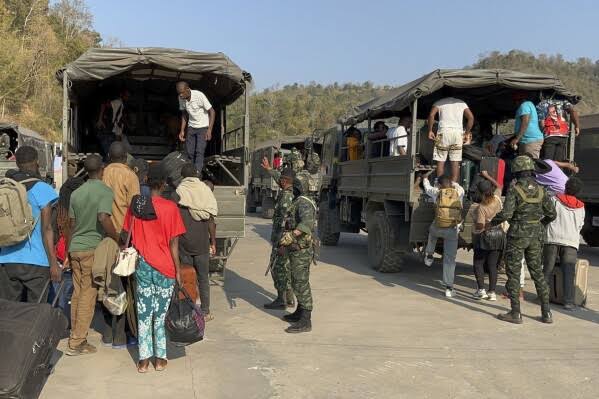Facebook Twitter (X) Instagram Somali Magazine - People's Magazine
In a major crackdown on human trafficking and online scam operations in Southeast Asia, Thai authorities announced that 260 individuals who were forced into working in scam centers in Myanmar will be repatriated to their home countries. The victims, hailing from 20 different nationalities, were rescued from Myanmar’s Myawaddy district and transported to Thailand’s Tak province on Wednesday.
The repatriation effort is part of an ongoing operation to dismantle scam networks that have thrived in Myanmar, Cambodia, and Laos, where criminal syndicates have exploited thousands of people. These scam centers, often protected by local militias, operate fraudulent schemes including fake investment pitches, romance scams, and illegal gambling platforms. U.N. experts estimate that these operations have defrauded victims worldwide of tens of billions of dollars.
According to Thai military officials, the rescued individuals include citizens of Ethiopia, Kenya, the Philippines, Malaysia, Pakistan, China, Indonesia, Nepal, Taiwan, Uganda, Brazil, Burundi, Tanzania, Bangladesh, Cambodia, Sri Lanka, Nigeria, Ghana, and India. Many of them were lured with false promises of legitimate jobs but were instead forced into what has been described as “virtual slavery.”
Reports indicate that the Democratic Karen Benevolent Army, an ethnic militia that controls parts of Myanmar’s border areas, played a key role in freeing the workers and escorting them to the Thai border. Myanmar’s military government has little influence over these frontier regions, where various armed groups operate both as protectors and participants in illicit activities, including drug trafficking and human smuggling.
The rescued individuals will undergo questioning by Thai authorities to determine their status as trafficking victims. Those confirmed as victims will be placed under protection before being sent back to their home countries. Thai Deputy Prime Minister and Defense Minister Phumtham Wechayachai emphasized that Thailand will only accept individuals who are ready for immediate repatriation, stating that the country does not plan to establish additional shelters for trafficking victims.
Thailand already hosts nine refugee camps along its border with Myanmar, providing shelter for over 100,000 people, mainly from the Karen ethnic minority. With a growing number of people being rescued from scam centers, the Thai government is tightening its policies on handling trafficking victims. Phumtham stressed the importance of gathering intelligence from the rescued workers to assist in dismantling trafficking and scam operations.
The crackdown on scam centers gained momentum in late 2023 when China, embarrassed by the scale of criminal activities along its border, pushed Myanmar’s ethnic militias to shut down illegal operations. In response, tens of thousands of Chinese nationals suspected of involvement in scam activities were repatriated. Beijing continues to exert pressure on regional governments to eliminate these networks, given that many of the scams primarily target Chinese citizens.
During a visit to China in early February, Thai Prime Minister Paetongtarn Shinawatra and Chinese President Xi Jinping pledged to intensify joint efforts against Southeast Asia’s scam networks. This commitment was reinforced by a visit from Liu Zhongyi, China’s Vice Minister of Public Security, who inspected border regions known for harboring scam operations.
To further disrupt these illicit activities, Thailand recently implemented measures to cut off electricity, internet, and gas supplies to areas in Myanmar where scam centers operate. This effort, launched just ahead of Paetongtarn’s visit to Beijing, is being considered for expansion to border regions adjacent to Cambodia, where similar fraudulent operations are known to exist. Thai Defense Ministry spokesperson Thanathip Sawangsang confirmed that authorities have already dismantled illegally installed internet cables in affected areas.
The global scale of these scams has drawn increasing attention, with reports of individuals from various countries being deceived into taking fraudulent job offers. Among the high-profile cases was that of Chinese actor Wang Xing, who was trafficked into a Myanmar scam center before his story gained widespread attention on social media, leading to his rescue.
With ongoing regional cooperation and mounting international pressure, authorities hope that further crackdowns will dismantle these exploitative networks and prevent more individuals from falling victim to trafficking and forced labor. However, the persistence of criminal syndicates, the involvement of local militias, and the lack of effective governance in certain border areas pose significant challenges to completely eradicating the problem.

